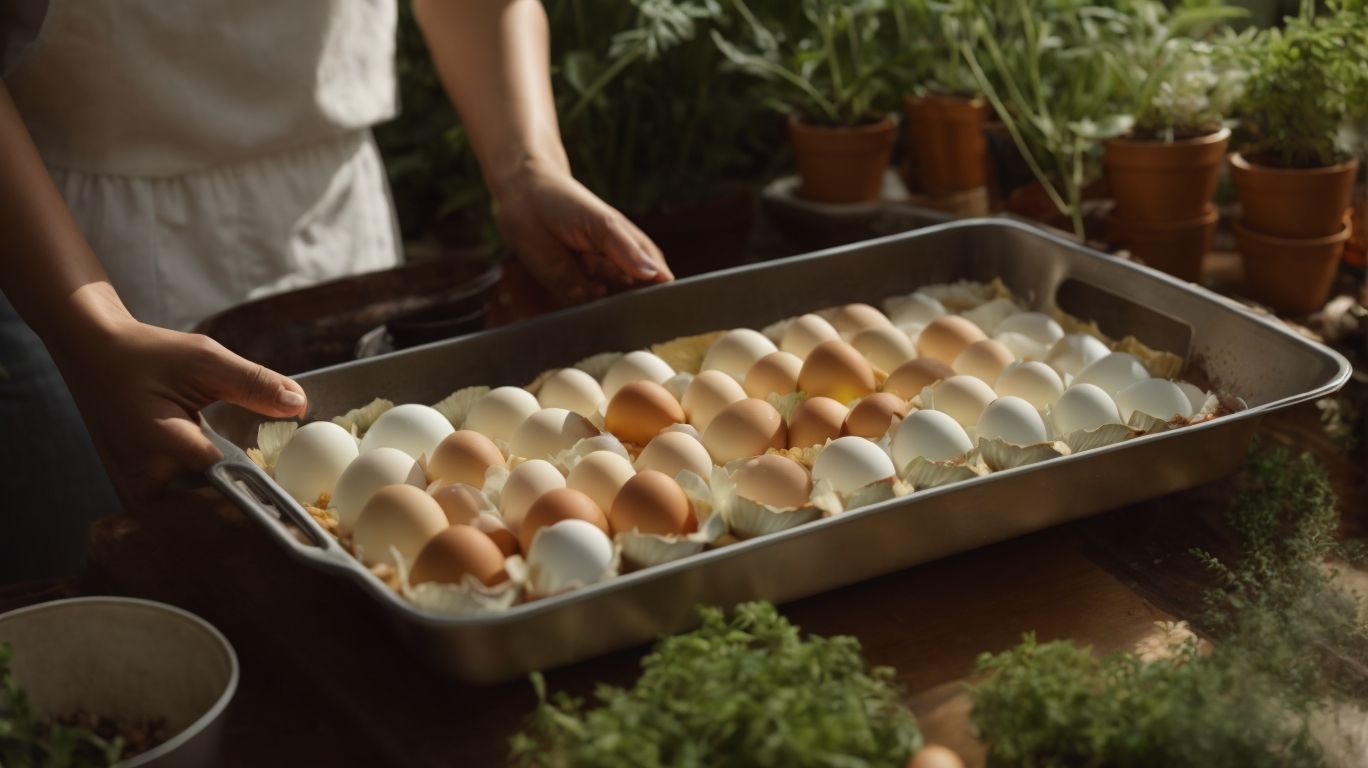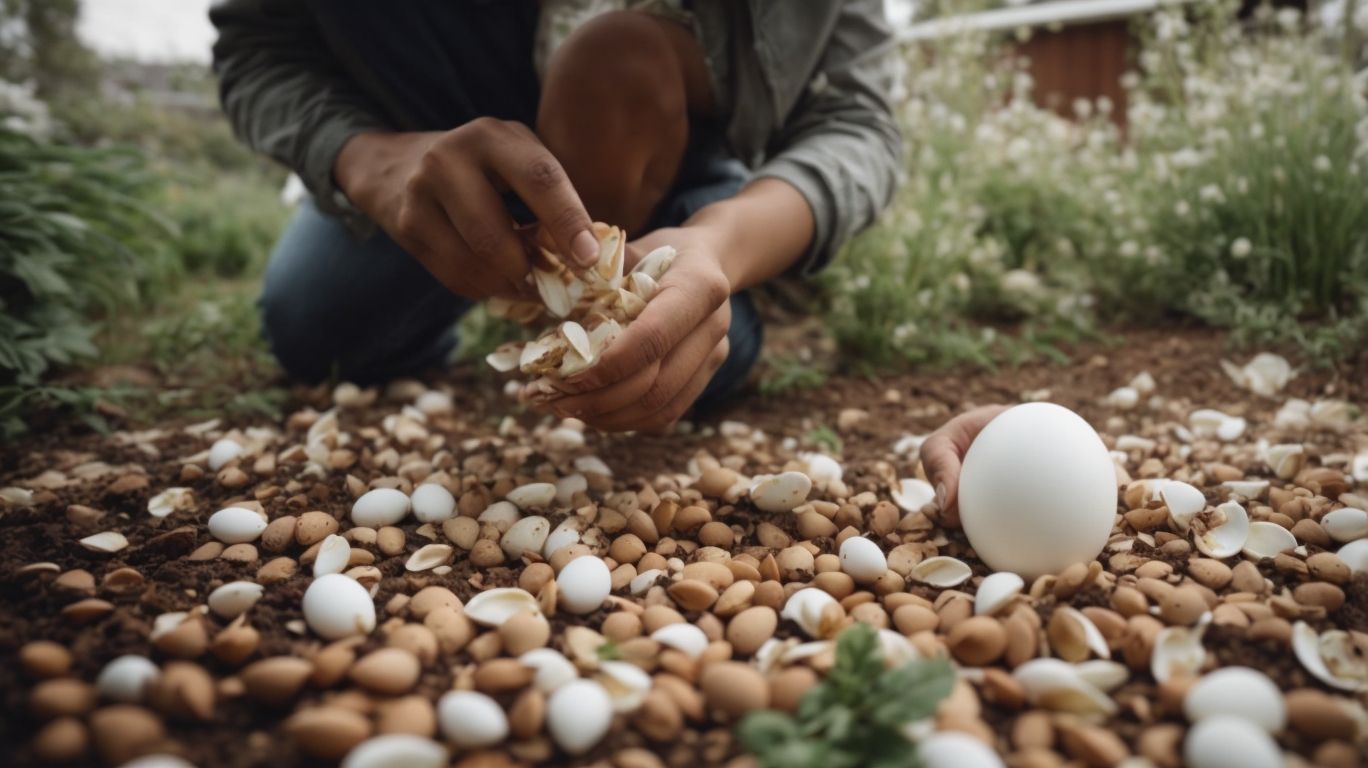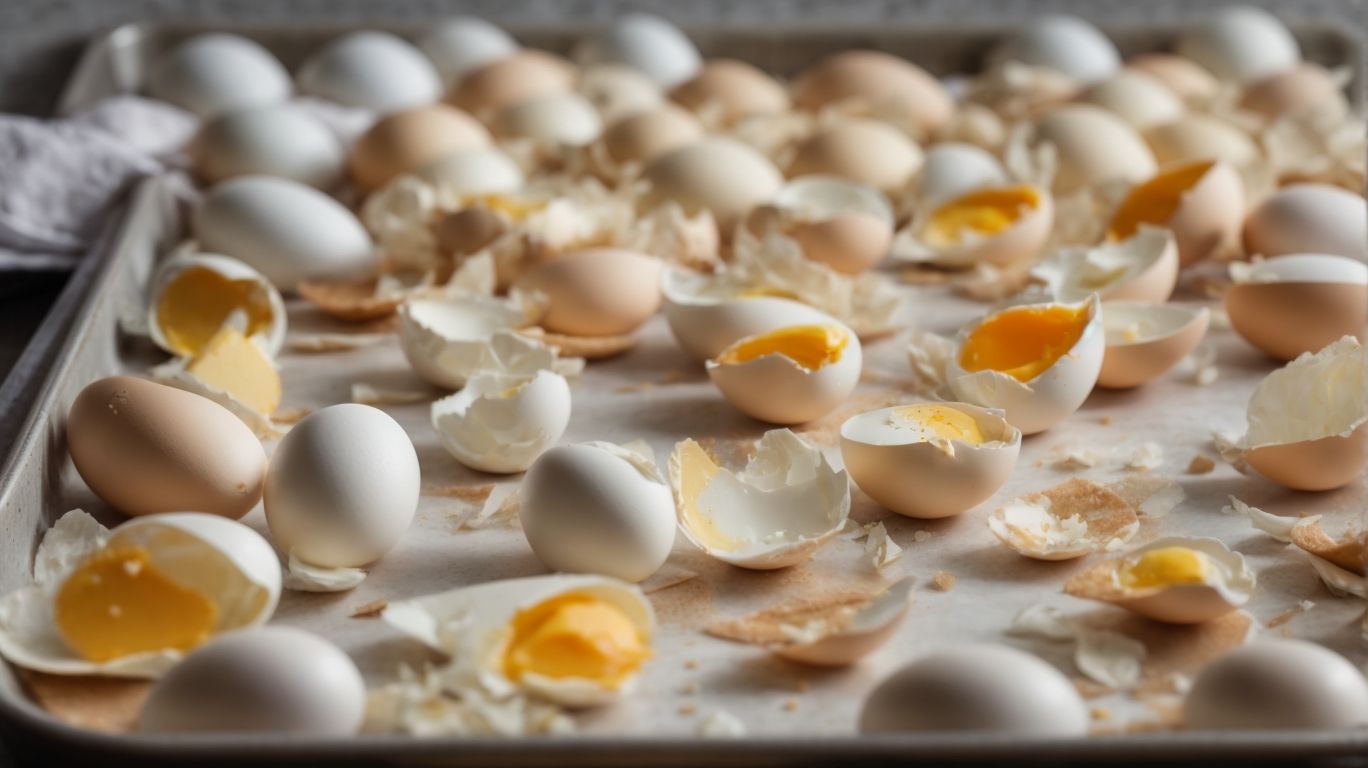How to Bake Egg Shells for Garden?
Are you looking for a natural and cost-effective way to boost your garden’s health and productivity?
Discover the benefits of using egg shells in the garden, how to prepare them for use, different methods of incorporating them into your garden, and important precautions to keep in mind.
Learn how to bake egg shells for your garden’s benefit.
Key Takeaways:
Why Use Egg Shells in the Garden?

Credits: Poormet.Com – Larry Rivera
Using eggshells in the garden is a beneficial practice that can enhance plant growth and soil quality.
Eggshells are rich in calcium, which is essential for the development of cell walls in plants, aiding in strengthening stems and promoting overall growth. When crushed, eggshells also act as a natural pest deterrent, as the sharp edges deter slugs and other soft-bodied garden pests.
Incorporating eggshells into compost piles helps in balancing the pH levels, ensuring a favorable environment for microorganisms that break down organic matter efficiently. This process results in nutrient-rich compost that can be added back to the soil to enhance its fertility and structure.
What Nutrients Do Egg Shells Provide?
Eggshells are rich sources of essential nutrients like calcium and magnesium that benefit plant growth and development.
Calcium is crucial for strengthening cell walls in plants, aiding in root development, and promoting proper enzyme functions. It also helps neutralize soil acidity, which is vital for nutrient absorption.
Magnesium plays a key role in photosynthesis, helping plants convert sunlight into energy and supporting the synthesis of chlorophyll. This mineral also assists in nutrient uptake and enzyme activation within plants.
How to Prepare Egg Shells for Garden Use?
Preparing eggshells for garden use involves cleaning, crushing, and baking them to maximize their effectiveness as a soil amendment.
Start by collecting eggshells from your kitchen. Remember to rinse them with water to remove any egg residue. Once clean, allow them to dry completely.
- Next, gently crush the dried eggshells using a pestle and mortar or a blender. Ensure they are crushed into small pieces but not into a fine powder. This step aids in releasing calcium and other nutrients slowly into the soil.
- After crushing, spread the eggshells on a baking sheet and bake them in the oven at a low temperature for about 10-15 minutes. Baking helps to sterilize the shells, making them better for plant use. Let them cool before storing them in an airtight container until ready for application in your garden.
Step 1: Clean and Dry the Egg Shells
The first step in preparing eggshells for garden use is to thoroughly clean and dry them to ensure they are free of contaminants and moisture.
-
To effectively clean the eggshells, start by gently tapping them against a hard surface to break them into smaller pieces.
-
Then, rinse the shells under running water to remove any remaining egg residue.
-
After rinsing, soak the shells in a bowl of warm water for about 20-30 minutes to loosen any stubborn bits of egg.
-
Using a soft brush or sponge, gently scrub the shells to remove any dirt or impurities.
-
Once cleaned, place the eggshells on a paper towel or drying rack to air dry completely.
-
Make sure they are thoroughly dried before storing them in a sealed container to prevent moisture buildup and mold growth.
Step 2: Crush the Egg Shells into Small Pieces
Crushing eggshells into small pieces is essential for increasing their surface area and facilitating the release of nutrients into the soil for plant uptake.
This process not only benefits the plants by providing them with easier access to essential nutrients like calcium, but it also acts as a natural pest deterrent due to the sharp edges of the crushed shells. Homesteaders can easily incorporate crushed eggshells into their gardening routine as a sustainable way to recycle kitchen waste while enhancing the health of their plants. By breaking down the eggshells, whether manually or using tools like a mortar and pestle, blender, or rolling pin, individuals can create a fine powder that can be sprinkled around the garden beds or added to compost piles.
Step 3: Bake the Egg Shells in the Oven
Baking eggshells in the oven helps to dry them out thoroughly and makes them easier to blend into a fine powder for garden application.
Removing moisture from eggshells through baking not only aids in the grinding process but also eliminates the risk of mold growth, ensuring a longer shelf life for the powdered eggshells.
- This practice also plays a vital role in killing potential pathogens that may be present on the surface of the eggshells, making them safer to use in your garden.
- By baking the eggshells, you can effectively reduce any lingering odors, creating a more pleasant experience when incorporating them into your soil or compost.
- The process of baking eggshells before grinding them is a simple yet essential step that enhances the overall quality and effectiveness of the resulting powder.
How to Use Egg Shells in the Garden?

Credits: Poormet.Com – Steven Taylor
Utilizing eggshells in the garden can be done by incorporating them into planting routines, particularly beneficial for crops like tomatoes and peppers.
One effective way to make use of eggshells is by crushing them into small pieces and spreading them around the base of the tomato and pepper plants. This method not only adds vital nutrients to the soil as the shells decompose but also acts as a natural barrier against certain pests.
In addition, creating an eggshell powder by grinding dried eggshells can be sprinkled onto the soil before planting. This powder enriches the soil with calcium, which is essential for the healthy growth of tomatoes and peppers, promoting strong root development and overall plant vigor.
Option 1: Add Egg Shells to Compost
Adding eggshells to compost enriches the soil with nutrients, aids in seed germination, and promotes healthy plant growth under sufficient sunlight.
When eggshells decompose in the compost pile, they release valuable minerals such as calcium, potassium, and magnesium into the soil, creating an ideal environment for plant roots to thrive. This nutrient-rich soil provides essential elements that plants need for healthy growth and development.
The coarse texture of crushed eggshells helps to improve soil aeration and drainage, preventing compaction and waterlogging. This enhanced soil structure supports better root growth and nutrient uptake for plants.
The calcium content in eggshells acts as a natural pH buffer, keeping the soil’s acidity levels in check, which is vital for the overall health of plants and the beneficial soil microbes.
Option 2: Scatter Crushed Egg Shells Around Plants
Scattering crushed eggshells around plants acts as a natural deterrent against pests like snails and slugs, protecting the garden from potential damage.
The sharp edges of the crushed eggshells create a barrier that these slimy pests find difficult to cross, effectively avoiding direct contact with the vulnerable plants. When snails and slugs try to crawl over the eggshell pieces, it causes discomfort and irritation, steering them away from the vegetation. This eco-friendly method not only helps in pest control but also serves as a sustainable way to recycle kitchen waste, promoting a healthier garden ecosystem. When using this technique, remember to crush the eggshells finely to maximize their effectiveness.
Option 3: Create an Egg Shell Tea Fertilizer
Creating an eggshell tea fertilizer infused with ingredients like oyster shell and Epsom salts provides a nutrient-rich solution to boost plant growth and color vibrancy.
When preparing this natural fertilizer, start by collecting eggshells after use, rinsing them thoroughly, and allowing them to dry completely. Next, crush the eggshells into small pieces using a mortar and pestle or a blender. Combine these crushed eggshells with powdered oyster shells, which are rich in calcium and other essential nutrients for plants.
To enhance the benefits further, add a tablespoon of Epsom salts to the mix. Epsom salts, composed of magnesium and sulfate, promote healthy root development and enhance nutrient absorption, contributing to overall plant vitality.
What Are the Benefits of Using Egg Shells in the Garden?
Using eggshells in the garden offers numerous benefits, such as improving soil quality, deterring pests, and providing essential nutrients to plants.
One of the key advantages of incorporating eggshells into gardening practices is their ability to enrich the soil. When crushed and added to the soil, eggshells gradually release calcium, potassium, and other minerals that promote plant growth and improve overall soil structure.
Eggshells act as a natural pest deterrent due to their sharp edges, which can help keep unwanted insects like slugs and snails away from plants. This eco-friendly method reduces the need for harmful chemical pesticides that can harm beneficial insects.
The calcium content in eggshells is beneficial for plants, promoting strong cell walls and overall plant health. By incorporating crushed eggshells in the garden, you can provide a sustainable and cost-effective source of nutrients for your plants, contributing to their long-term growth and vitality.
Improves Soil Quality
Eggshells contribute to improving soil quality by enriching it with essential nutrients like calcium and magnesium, enhancing plant growth and vitality.
The gradual breakdown of eggshells in the soil allows for the slow release of these vital nutrients, acting as a natural fertilizer for surrounding plants. This process not only enriches the soil but also helps in balancing its pH levels, creating a more hospitable environment for plant roots to thrive.
Plus calcium and magnesium, eggshells also contain phosphorus, potassium, and other trace minerals that further enhance the soil’s fertility. These nutrients play a crucial role in supporting cellular processes within plants, leading to healthier growth, increased flower production, and overall improved resilience.
Provides Essential Nutrients to Plants
Eggshells provide essential nutrients like calcium to plants, supplementing their diet and contributing to overall health and growth, similar to fish emulsion fertilizer.
This natural and cost-effective method of plant nourishment not only enhances soil quality but also reduces waste by repurposing kitchen scraps.
When crushed eggshells are added to the soil, they gradually release calcium, helping in the prevention of blossom end rot in tomatoes and peppers.
The slow breakdown of eggshells provides a steady supply of nutrients to plants over time, promoting sturdy cell walls and improving root development.
This process mirrors the gradual nutrient release of commercial fertilizers, offering a sustainable alternative for home gardeners.
Deters Pests and Protects Plants
Eggshells act as a natural barrier against pests like snails and slugs, protecting plants from potential damage and reducing pest infestations effectively.
When crushed and scattered around the garden, the sharp edges of the eggshells create a hostile environment for these slimy creatures, deterring them from approaching the plants. As the eggshells break down over time, they release calcium carbonate into the soil, enriching it and benefitting plant growth. This dual-action of physical barrier and soil amendment not only safeguards the plants but also promotes a healthier garden ecosystem overall.
Environmentally Friendly and Cost-effective
Utilizing eggshells in the garden is both environmentally friendly and cost-effective, providing a sustainable method of feeding plants without reliance on chicken manure.
Aside from being a natural source of calcium and other essential minerals, eggshells act as a natural pest deterrent, deterring slugs and snails due to their sharp edges.
By incorporating crushed eggshells into the soil, gardeners can improve drainage and aeration, promoting healthier root growth and overall plant vitality.
This practice not only reduces waste but also showcases an innovative way to repurpose kitchen scraps for the benefit of the environment and plant life.
Are There Any Precautions When Using Egg Shells in the Garden?
While using eggshells in the garden has numerous benefits, it is essential to take precautions to ensure their effective and safe application without risks.
One of the key precautions to keep in mind when using eggshells in gardening is to avoid overuse, as too much calcium from the eggshells can alter the soil pH, affecting plant growth negatively. To manage their application effectively, consider crushing the eggshells into small pieces to speed up their decomposition process and provide a gradual release of nutrients.
Ensure that the eggshells are clean and free from any remnants of egg or bacteria to maintain a safe gardening environment. By following these control methods and safe practices, you can maximize the benefits of using eggshells without encountering potential risks.
Avoid Using Egg Shells from Unhealthy or Tainted Eggs
To prevent potential contamination, it is crucial to avoid using egg shells from unhealthy or tainted eggs, particularly those intended for selling or coloring purposes.
When selecting eggshells for various uses, one should prioritize sourcing them from reputable and trusted sources, such as organic farms or reliable suppliers. The risk of using shells that come from eggs contaminated with bacteria, pesticides, or other harmful substances can pose serious health dangers. Such eggs, often found in large-scale commercial operations or those meant for industrial processes, may not meet the same quality standards as eggs meant for human consumption. Ensuring the quality of the shells you use can significantly reduce the likelihood of exposure to potential health hazards.
Use Caution When Handling Crushed Egg Shells
Handling crushed eggshells requires caution to avoid any injuries or contamination, especially when blending them or using them in natural remedies.
The given text is already in HTML format with some basic formatting. If you would like, I can further enhance the formatting. Let me know if you would like me to make any specific changes.
Do Not Overuse Egg Shells in the Garden
Overusing eggshells in the garden can lead to imbalances in soil composition, so it’s crucial to apply them in moderation and allow excess shells to dry out or store for later use.
Excessive use of eggshells can disrupt the pH levels of the soil, making it too alkaline for certain plants to thrive. By using a balanced approach to incorporating eggshells, gardeners can benefit from the calcium-rich nutrients they provide without risking adverse effects.
When accumulating a surplus of eggshells, it’s advisable to crush them into smaller pieces to aid in decomposition. Properly dried eggshells can also be ground into powder and stored in airtight containers for prolonged preservation, ensuring a sustainable source of mineral supplementation for the garden.
Frequently Asked Questions
What are the benefits of baking egg shells for garden use?
Baking egg shells for garden use has several benefits, including adding nutrients to the soil, deterring pests, and promoting plant growth.
How do I prepare the egg shells for baking?
To prepare egg shells for baking, first clean and dry them, then crush them into small pieces. You can also use a food processor or mortar and pestle to crush them.
What temperature and duration should I use when baking egg shells for my garden?
It is recommended to bake egg shells at a low temperature of 200-250 degrees Fahrenheit for 30-60 minutes. This will ensure that the shells are properly sterilized without burning them.
Can I use any type of egg shells for baking in my garden?
Yes, you can use any type of egg shells, including chicken, duck, or even quail egg shells. Just make sure they are clean and properly crushed before baking.
How often should I add baked egg shells to my garden?
It is recommended to add baked egg shells to your garden every 2-3 months or whenever you feel your soil needs a nutrient boost. You can also sprinkle them around specific plants for targeted benefits.
Are there any special precautions I should take when using baked egg shells in my garden?
Yes, it is important to only use clean and properly crushed egg shells and to spread them evenly in your garden. Also, be careful not to touch the hot shells when taking them out of the oven.

